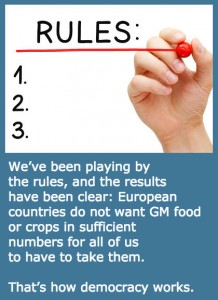By Eve Mitchell

Another day, another disappointment about genetically modified (GM) food to fire us up. So be it.
Followers of our GM woes here in the EU may remember that the hard-won scientific underpinning of our laws on GM food and crops have been slowly undermined over the past few years, and our confidence in our food system further eroded at each step. Non-GM animal feed can now contain up to 0.9% GM material, which doesn’t feel like “non-GM” at all, and some want to apply a similar contamination level to food now, too. The central system for authorising new GM crops now enables countries to ban (sorry, “opt out”) of approved crops, confusing the pan-EU Single Market and annoying both citizens and the GM industry in one go. Honey can now contain GM pollen, but you have no way of knowing if it’s in the jar on your table.
We’ve been playing by the rules, and the results have been clear: European countries do not want GM food or crops in sufficient numbers for all of us to have to take them. That’s how democracy works.
Yet for reasons that escape me this has been deemed insufficient, so we’ve been put through a ringer of adjustments and reformulations to get “better” results. Better in this case clearly means more GM in the food chain and less clarity for consumers about what food labels really mean.
This week we got a new treat. The Commission finally published its proposal for “improving” GM food and feed authorisations. From the very beginning of Commission President Junker’s tenure (his July 2014 Opening Statement to Parliament in fact), democracy in GMO decision-making has been at the heart of some big promises. Junker has failed to honour all of them:
- In 2014 Junker said “it is simply not right” that a GM crop can be approved when a clear majority of Member States is against it. The latest proposal does nothing at all to remove this possibility.
- In 2014 Junker said the Commission should be able to give equal weight to the majority view of democratically elected governments and scientific advice. The latest proposal does not alter in any way the current authorisation rules to enable this.
- In 2014 Junker invoked food and environmental safety as important considerations in deciding about GMOs, yet these are precisely the areas excluded today from the grounds upon which countries may be able to ban GM food or feed if this charade goes forward.
- Since the most recent effort doesn’t actually alter the authorisation process, we’ll have to wait and see if it makes approving GMOs any easier or not. A big question for me is why Europe is going to such lengths to try to facilitate something we don’t want. Something’s clearly afoot.
The only thing EU countries are offered today is a limited potential to ban GM food or feed after it is authorised. We all know the authorisation process itself is the problem, since a majority of both countries and Parliamentarians can oppose a GMO and it can still be authorised. In fact the proposal itself admits that no GMO in the history of the current rules has ever been approved by EU countries – they are always pushed through by the Commission. Junker promised to fix this with a nice healthy dose of democracy.
We know what democracy feels like. This ain’t it.


